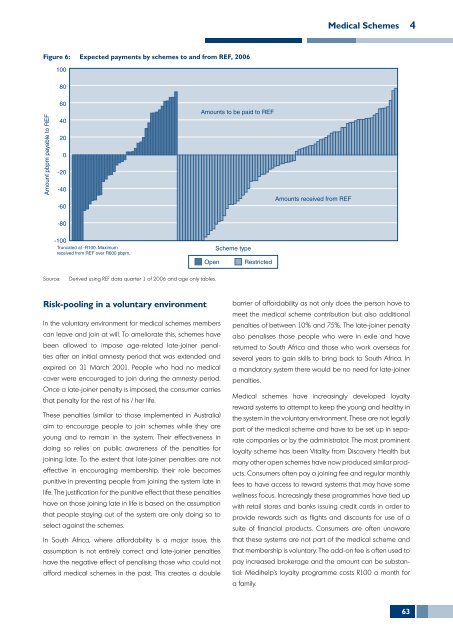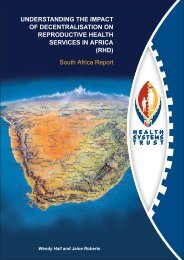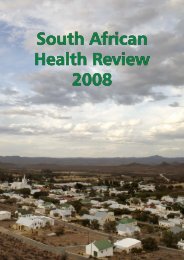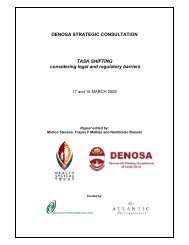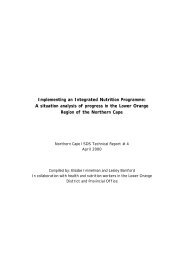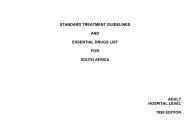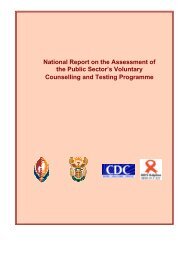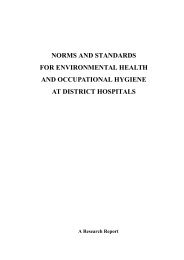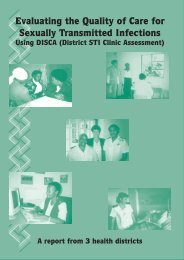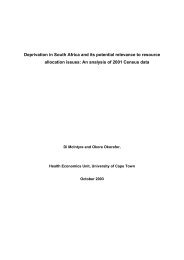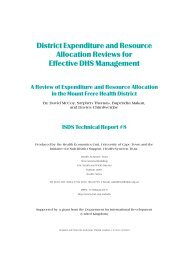- Page 2 and 3:
South African Health Review 2007 LI
- Page 4:
Foreword The 12th edition of South
- Page 7 and 8:
12 Traditional and Complementary Me
- Page 9 and 10:
Other Funders for the Health System
- Page 11 and 12:
This response raises a number of qu
- Page 13 and 14:
ucts are currently sold without reg
- Page 15 and 16:
The authors conclude that mandatory
- Page 17 and 18:
servicing and inappropriate hospita
- Page 19 and 20:
systems is also critical; worrying
- Page 22 and 23:
Authors: Laetitia Rispel i Geoffrey
- Page 24 and 25:
Stewardship: Protecting the Public
- Page 26 and 27:
Stewardship: Protecting the Public
- Page 28 and 29:
Stewardship: Protecting the Public
- Page 30 and 31:
Stewardship: Protecting the Public
- Page 32 and 33: Stewardship: Protecting the Public
- Page 34 and 35: Stewardship: Protecting the Public
- Page 36: Stewardship: Protecting the Public
- Page 39 and 40: Introduction The importance of the
- Page 41 and 42: diseases such as tuberculosis and t
- Page 43 and 44: 17 of 2002). This Act entirely repl
- Page 45 and 46: (d) and any other matter relating t
- Page 47 and 48: Year Act No. Title Objects 1997 90
- Page 49 and 50: References 1 Department of Health.
- Page 52: Purchasing of Health Care 33Pooling
- Page 55 and 56: Introduction This chapter presents
- Page 57 and 58: Medical schemes are the largest fin
- Page 59 and 60: per person dependent on the public
- Page 61 and 62: An increase in hospital expenditure
- Page 63 and 64: private pharmacy do so for self-tre
- Page 65 and 66: References 1 McIntyre D, Thiede M,
- Page 67 and 68: Policy and legislative framework In
- Page 69 and 70: Medical schemes and revenue collect
- Page 71 and 72: There is evidence that when faced w
- Page 73 and 74: are thus contributing factors to th
- Page 75 and 76: Figure 2: Historic membership of me
- Page 77 and 78: Solvency of the risk pools has beco
- Page 79 and 80: Figure 4: 100 Proportion of risk be
- Page 81: will retain that benefit for their
- Page 85 and 86: From a benefit design perspective t
- Page 87 and 88: and towards competition based on ef
- Page 89 and 90: 37 Du Preez L. Registrar wants cura
- Page 91 and 92: Introduction There has long been co
- Page 93 and 94: an element of cream-skimming which
- Page 95 and 96: Table 1: Distribution of health car
- Page 97 and 98: isk equalisation mechanism were imp
- Page 99 and 100: once the cost spiral in medical sch
- Page 101 and 102: Revenue collection: Collecting orga
- Page 103 and 104: Current debates A key area of ongoi
- Page 105 and 106: References 1 Gluckman H. The Provis
- Page 108 and 109: Authors: Patrick Matshidze i Lyn Ha
- Page 110 and 111: Health Information Systems in the P
- Page 112 and 113: Health Information Systems in the P
- Page 114 and 115: Health Information Systems in the P
- Page 116 and 117: Health Information Systems in the P
- Page 118 and 119: Health Information Systems in the P
- Page 120 and 121: Health Information Systems in the P
- Page 122 and 123: Authors: Shahieda Adams i Reno Mora
- Page 124 and 125: Health and Health Care in the Workp
- Page 126 and 127: Health and Health Care in the Workp
- Page 128 and 129: Health and Health Care in the Workp
- Page 130 and 131: Health and Health Care in the Workp
- Page 132 and 133:
Health and Health Care in the Workp
- Page 134 and 135:
Health and Health Care in the Workp
- Page 136 and 137:
Health and Health Care in the Workp
- Page 138 and 139:
Health and Health Care in the Workp
- Page 140 and 141:
Health and Health Care in the Workp
- Page 142 and 143:
Author: Bettina Taylor i 8 Rationin
- Page 144 and 145:
Rationing of Medicines and Health C
- Page 146 and 147:
Rationing of Medicines and Health C
- Page 148 and 149:
Rationing of Medicines and Health C
- Page 150 and 151:
Rationing of Medicines and Health C
- Page 152 and 153:
Rationing of Medicines and Health C
- Page 154 and 155:
Rationing of Medicines and Health C
- Page 156 and 157:
Rationing of Medicines and Health C
- Page 158 and 159:
Health Care Delivery 139
- Page 160 and 161:
Authors: Haroon Wadee i Farzana Kha
- Page 162 and 163:
Human Resources for Health 9 Table
- Page 164 and 165:
Human Resources for Health 9 Table
- Page 166 and 167:
Human Resources for Health 9 source
- Page 168 and 169:
Human Resources for Health 9 Refere
- Page 170 and 171:
Authors: Shadrack Shuping i Sipho K
- Page 172 and 173:
Public-Private Partnerships 10 Alth
- Page 174 and 175:
Public-Private Partnerships 10 Tabl
- Page 176 and 177:
Public-Private Partnerships 10 Conc
- Page 178 and 179:
Authors: Thulani Matsebula i Michae
- Page 180 and 181:
Private Hospitals 11 Table 1: Priva
- Page 182 and 183:
Private Hospitals 11 Table 3: Distr
- Page 184 and 185:
Private Hospitals 11 Human resource
- Page 186 and 187:
Private Hospitals 11 Figure 3: 16 T
- Page 188 and 189:
Private Hospitals 11 Figure 4: 2 50
- Page 190 and 191:
Private Hospitals 11 Monitoring qua
- Page 192 and 193:
Private Hospitals 11 Recommendation
- Page 194 and 195:
Authors: Nceba Gqaleni i Indres Moo
- Page 196 and 197:
Traditional and Complementary Medic
- Page 198 and 199:
Traditional and Complementary Medic
- Page 200 and 201:
Traditional and Complementary Medic
- Page 202 and 203:
Traditional and Complementary Medic
- Page 204 and 205:
Traditional and Complementary Medic
- Page 206 and 207:
Traditional and Complementary Medic
- Page 208 and 209:
Authors: Myles Mander i Lungile Ntu
- Page 210 and 211:
Economics of the Traditional Medici
- Page 212 and 213:
Economics of the Traditional Medici
- Page 214 and 215:
Economics of the Traditional Medici
- Page 216 and 217:
Economics of the Traditional Medici
- Page 218 and 219:
Economics of the Traditional Medici
- Page 220 and 221:
Authors: Marion Stevens i Edina Sin
- Page 222 and 223:
HIV and AIDS, STI and TB in the Pri
- Page 224 and 225:
HIV and AIDS, STI and TB in the Pri
- Page 226 and 227:
HIV and AIDS, STI and TB in the Pri
- Page 228 and 229:
HIV and AIDS, STI and TB in the Pri
- Page 230 and 231:
HIV and AIDS, STI and TB in the Pri
- Page 232 and 233:
Indicators 213
- Page 234 and 235:
Authors: Candy Day i Andy Gray ii 1
- Page 236 and 237:
Health and Related Indicators 15
- Page 238 and 239:
Health and Related Indicators 15
- Page 240 and 241:
Health and Related Indicators 15 Ta
- Page 242 and 243:
Health and Related Indicators 15 Ta
- Page 244 and 245:
Health and Related Indicators 15 Ta
- Page 246 and 247:
Health and Related Indicators 15 Ta
- Page 248 and 249:
Health and Related Indicators 15 Th
- Page 250 and 251:
Health and Related Indicators 15 Ta
- Page 252 and 253:
Health and Related Indicators 15 Ta
- Page 254 and 255:
Health and Related Indicators 15 Tu
- Page 256 and 257:
Health and Related Indicators 15 Fi
- Page 258 and 259:
Health and Related Indicators 15 He
- Page 260 and 261:
Health and Related Indicators 15 Ta
- Page 262 and 263:
Health and Related Indicators 15 tr
- Page 264 and 265:
Health and Related Indicators 15 Fi
- Page 266 and 267:
Health and Related Indicators 15 He
- Page 268 and 269:
Health and Related Indicators 15 Fi
- Page 270 and 271:
Health and Related Indicators 15 Ta
- Page 272 and 273:
Health and Related Indicators 15 Ta
- Page 274 and 275:
Health and Related Indicators 15 He
- Page 276 and 277:
Health and Related Indicators 15 He
- Page 278 and 279:
Health and Related Indicators 15 Ta
- Page 280 and 281:
Health and Related Indicators 15 Nu
- Page 282 and 283:
Health and Related Indicators 15 He
- Page 284 and 285:
Health and Related Indicators 15 19
- Page 286 and 287:
Health and Related Indicators 15 He
- Page 288 and 289:
Health and Related Indicators 15 Ta
- Page 290 and 291:
Health and Related Indicators 15 No
- Page 292 and 293:
Health and Related Indicators 15 Ta
- Page 294 and 295:
Health and Related Indicators 15 Be
- Page 296 and 297:
Health and Related Indicators 15 He
- Page 298 and 299:
Health and Related Indicators 15 Fi
- Page 300 and 301:
Health and Related Indicators 15 He
- Page 302 and 303:
Health and Related Indicators 15 De
- Page 304 and 305:
Health and Related Indicators 15 Ma
- Page 306 and 307:
Health and Related Indicators 15 Ea
- Page 308 and 309:
Health and Related Indicators 15 Fr
- Page 310 and 311:
Health and Related Indicators 15 Ga
- Page 312 and 313:
Health and Related Indicators 15 Kw
- Page 314 and 315:
Health and Related Indicators 15 He
- Page 316 and 317:
Health and Related Indicators 15 Li
- Page 318 and 319:
Health and Related Indicators 15 Mp
- Page 320 and 321:
Health and Related Indicators 15 No
- Page 322 and 323:
Health and Related Indicators 15 No
- Page 324 and 325:
Health and Related Indicators 15 We
- Page 326 and 327:
Health and Related Indicators 15
- Page 328 and 329:
Health and Related Indicators 15 Ta
- Page 330 and 331:
Health and Related Indicators 15 Ta
- Page 332 and 333:
Health and Related Indicators 15 He
- Page 334 and 335:
Health and Related Indicators 15 He
- Page 336 and 337:
Health and Related Indicators 15 Pu
- Page 338 and 339:
Health and Related Indicators 15 Ta
- Page 340 and 341:
Health and Related Indicators 15 Di
- Page 342 and 343:
Health and Related Indicators 15 He
- Page 344 and 345:
Health and Related Indicators 15 He
- Page 346 and 347:
Health and Related Indicators 15 In
- Page 348 and 349:
Health and Related Indicators 15 Ta
- Page 350 and 351:
Health and Related Indicators 15 In
- Page 352 and 353:
Health and Related Indicators 15 Ty
- Page 354 and 355:
Health and Related Indicators 15 Ty
- Page 356 and 357:
Health and Related Indicators 15 Ty
- Page 358 and 359:
Health and Related Indicators 15 Ch
- Page 360 and 361:
Health and Related Indicators 15 MD
- Page 362 and 363:
Health and Related Indicators 15 St
- Page 364 and 365:
Glossary AFA AIDS ALP AMA ANC ART A
- Page 366 and 367:
Glossary KZN LFS LIMS LP LPP MAR MC
- Page 368 and 369:
Glossary SAPC SARS SASIM SASSA SEP
- Page 370 and 371:
Index A Acts (Legislation and Bills
- Page 372 and 373:
Index N and O National Health Refer


